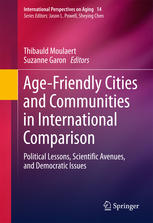

Most ebook files are in PDF format, so you can easily read them using various software such as Foxit Reader or directly on the Google Chrome browser.
Some ebook files are released by publishers in other formats such as .awz, .mobi, .epub, .fb2, etc. You may need to install specific software to read these formats on mobile/PC, such as Calibre.
Please read the tutorial at this link: https://ebookbell.com/faq
We offer FREE conversion to the popular formats you request; however, this may take some time. Therefore, right after payment, please email us, and we will try to provide the service as quickly as possible.
For some exceptional file formats or broken links (if any), please refrain from opening any disputes. Instead, email us first, and we will try to assist within a maximum of 6 hours.
EbookBell Team

4.0
26 reviewsThe supportive role of urban spaces in active aging is explored on a world scale in this unique resource, using the WHO’s Age-Friendly Cities and Community model. Case studies from the U.S., Canada, Australia, Hong Kong, and elsewhere demonstrate how the model translates to fit diverse social, political, and economic realities across cultures and continents, ways age-friendly programs promote senior empowerment, and how their value can be effectively assessed. Age-friendly criteria for communities are defined and critiqued while extensive empirical data describe challenges as they affect elders globally and how environmental support can help meet them. These chapters offer age-friendly cities as a corrective to the overemphasis on the medical aspects of elders’ lives, and should inspire new research, practice, and public policy.
Included in the coverage:
With its balance of attention to universal and culture-specific concerns, Age-Friendly Cities and Communities in International Comparison will be of particular interest to sociologists, gerontologists, and policymakers.
“Given the rapid adoption of the age-friendly perspective, following its development by the World Health Organization, the critical assessment offered in this volume is especially welcome”.
Professor Chris Phillipson, University of Manchester